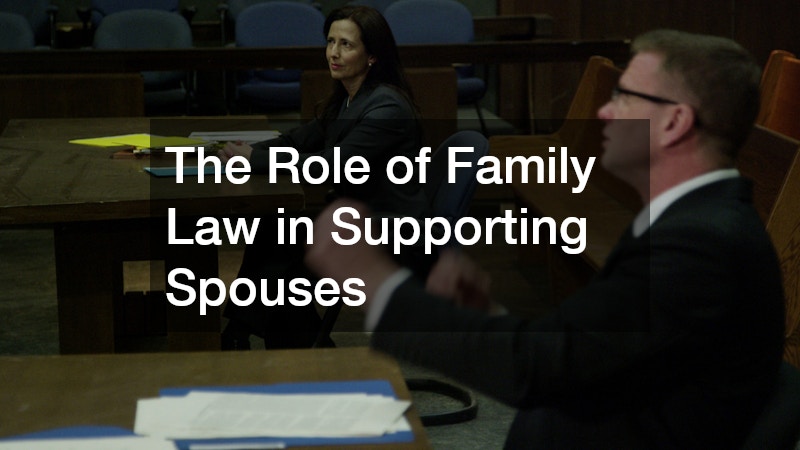Family law serves as a crucial framework within the legal system, ensuring the protection and fair treatment of individuals within familial relationships. It plays a vital role in addressing issues involving marriage, divorce, child custody, and spousal support.
By examining how family law safeguards parents, children, and spouses, we can appreciate its significant impact on maintaining harmony and justice within families.
The Role of Family Law in Protecting Parents
Family law provides a robust structure that addresses the rights and responsibilities of parents toward their children. In cases of divorce or separation, it establishes guidelines for child custody, ensuring that the best interests of the child are prioritized. This legal framework ensures that parents have clear expectations and responsibilities, which helps in reducing conflict and promoting cooperation. Additionally, family law facilitates the establishment of paternity, a critical step that enables fathers to assert their parental rights and participate actively in their child’s life. Through these measures, family law supports parents in maintaining meaningful relationships with their children.
Moreover, family law addresses financial responsibilities through child support agreements, ensuring that children’s needs are met. By mandating financial contributions from both parents, family law helps to provide stability and continuity in the child’s life. This aspect of family law mitigates the financial disparities that can occur after a family separation, helping to prevent child poverty. Enforcement mechanisms within family law ensure compliance with child support orders, further protecting the welfare of children. Therefore, family law is integral in supporting parents as they fulfill their roles in nurturing and providing for their children.
Family law also plays a role in protecting parents from domestic abuse and providing legal avenues for victims to seek safety and justice. Restraining orders and other protective measures can be obtained through the family court system, offering immediate relief and long-term solutions. The legal support available through family law empowers parents to make decisions free from intimidation or coercion. This protective function of family law is essential in ensuring a safe and healthy environment for both parents and their children. In these ways, family law acts as a shield, safeguarding parents and enabling them to fulfill their parental roles effectively and securely.
How Family Law Safeguards Children
Family law has a profound impact on the lives of children by prioritizing their well-being in all legal decisions. Judges often use the standard of “the best interests of the child” to make determinations in custody and visitation cases. This principle ensures that children’s needs, preferences, and developmental stages are considered in any legal arrangement. By focusing on the best interests of the child, family law aims to minimize the emotional upheaval and instability that often accompany family disputes. This legal focus underscores the centrality of children’s welfare in every aspect of family law.
Additionally, family law provides mechanisms for addressing neglect and abuse, ensuring that children are protected from harm. Social services may intervene in situations where a child’s safety is at risk, and family courts can issue protective orders to prevent further abuse. In severe cases, family law allows for the termination of parental rights to protect the child’s well-being. These legal interventions serve as important safeguards that ensure children are raised in secure and nurturing environments. Thus, family law functions as an essential protective barrier for children facing challenging family dynamics.
Another critical aspect of family law is the establishment of guardianship and adoption processes, providing permanent and stable homes for children in need. Legal frameworks ensure that the transition into a new family structure is conducted with the child’s best interests as a priority. Adoption laws and procedures are meticulously designed to ensure that adopted children have the same legal protections and rights as biological children. Through these legal mechanisms, family law strives to provide every child with the opportunity to thrive in a supportive family environment. By enabling guardianships and adoptions, family law not only protects children but also expands their opportunities for a brighter future.
The Role of Family Law in Supporting Spouses
Family law is instrumental in supporting spouses, particularly in cases of divorce or dissolution of marriage. It outlines processes for dividing marital property, ensuring a fair and equitable distribution of assets. This legal clarity often helps reduce disputes and provides spouses with the financial security needed to start anew. Through spousal support orders, family law assists in balancing the financial disparities that may arise from the end of a marriage. This support is crucial for spouses who may have sacrificed career advancement for domestic responsibilities during the marriage.
Family law offers essential legal pathways for victims of domestic violence, providing measures to protect spouses from further harm. Protective orders and access to emergency housing are among the resources available through family courts. These legal protections empower individuals to leave abusive situations and seek a safe environment for themselves and any children involved. By offering these protections, family law plays a critical role in safeguarding the emotional and physical well-being of spouses. The support provided through family law contributes to a more just society where individuals can lead lives free from fear and harm.





